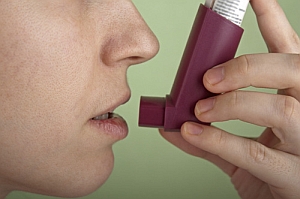A clinical trial testing a new asthma drug by the pharmaceutical companies Sanofi in Paris and Regeneron Pharmaceuticals in Tarrytown, New York shows the drug sharply cut the rate of asthma exacerbations or attacks compared to a placebo in patients with moderate to severe forms of the disease. The findings were reported yesterday in the New England Journal of Medicine and at the annual meeting of the American Thoracic Society in Philadelphia.
Asthma is a chronic lung disease marked by inflammation of the airways, causing wheezing, shortness of breath, and coughing. Some 25 million people in the U.S. have asthma, including about 7 million children.
The trial was an intermediate-stage (phase 2) test of dupilumab, a monoclonal antibody that targets the signaling protein interleukin 4, a modulator of signals driving type 2 helper T cells, a type of white blood cells triggering inflammatory immune system responses. Dupilumab was originally developed by Regeneron, then licensed to Sanofi for further development and commercialization.
The study tested dupilumab against a placebo among adults with moderate to severe eosinophilic asthma — a type of elevated white blood cell count — and who had not responded well to conventional control strategies, such as inhaled glucocorticosteroids. The 104 participants at 50 sites in the U.S. were randomly and evenly divided between those receiving dupilumab and those receiving a placebo. Patients received injections of dupilumab or the placebo once a week for 12 weeks. All patients were asked to taper off and then end their use of conventional treatments by week 9.
The trial looked at occurrences of asthma exacerbations as the primary indicator of dupilumab’s effect, and found 3 of the 52 patients receiving the drug experienced exacerbations, while 23 of the placebo patients had the attacks, an 87 percent difference in their occurrence. The study also reported statistically significant improvements in other indicators of lung function and asthma symptoms between the dupilumab and placebo recipients.
Mild to moderate adverse reactions were reported in large majorities of both the dupilumab (81%) and placebo (77%) groups. Adverse effects included injection site reactions, inflammation of nose and throat passages, upper respiratory tract infections, headache, and nausea.
George Yancopoulos, Regeneron’s president, says more phase 2 trials of dupilumab are planned testing the drug further with asthma patients, and expanding the tests to include atopic dermatitis or eczema, a skin inflammation that sometimes accompanies asthma.
Read more:
- Asthma Drug Reveals Potential as Diabetes, Obesity Treatment
- Genetics Company Lands NIH Allergies, Asthma Research Grant
- FDA Approves Inhaled Aerosol Asthma Maintenance Drug
- Smartphone App Helps Monitor Lung Function
- 4D Lung Imaging Technology Developed
Hat tip: FirstWord Pharma
* * *


 RSS - Posts
RSS - Posts
[…] Clinical Trial Shows Antibody Effective with Severe Asthma […]